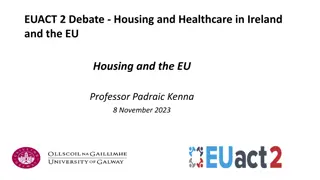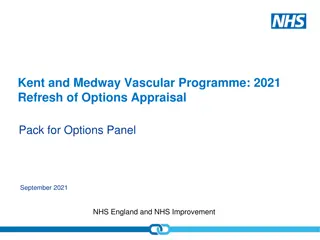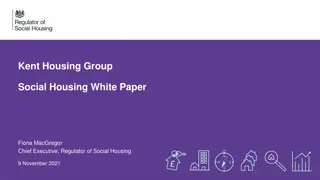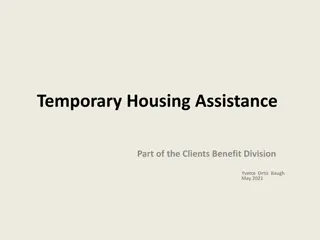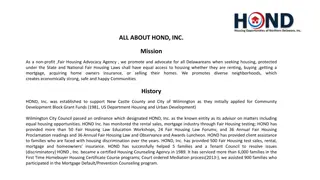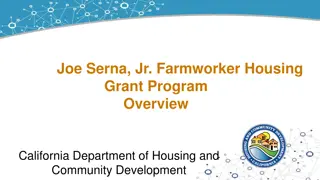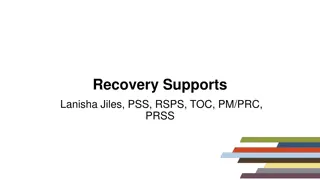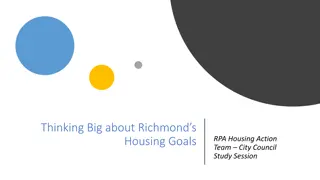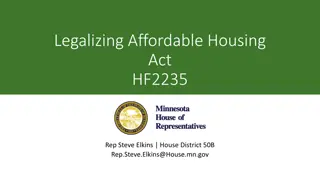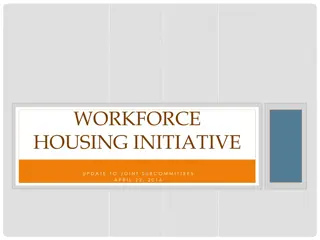Kent Housing Group Recovery Update
Kent Resilience Forum Recovery Update for the Kent Housing Group on June 25, 2020. Learn about the Recovery Co-ordinating Group's structure, purpose, and its role in leading the recovery phase post-pandemic. Explore the various thematic cells and subgroups focusing on critical areas like households in financial crisis, children & young people, health & social care, and more.
Download Presentation

Please find below an Image/Link to download the presentation.
The content on the website is provided AS IS for your information and personal use only. It may not be sold, licensed, or shared on other websites without obtaining consent from the author.If you encounter any issues during the download, it is possible that the publisher has removed the file from their server.
You are allowed to download the files provided on this website for personal or commercial use, subject to the condition that they are used lawfully. All files are the property of their respective owners.
The content on the website is provided AS IS for your information and personal use only. It may not be sold, licensed, or shared on other websites without obtaining consent from the author.
E N D
Presentation Transcript
Kent Resilience Forum Recovery Update Kent Housing Group, 25thJune 2020 Karla Phillips, programme manager for KRF Recovery Co-ordinating Group
KRF Recovery Co-ordinating Group (RCG): Upper-tier local authority has a statutory duty to lead the recovery phase under the Civil Contingencies Act The KRF has established a multi-agency Recovery Coordinating Group as required by Government guidance The purpose of this Group is to co-ordinate with partners across Kent and Medway to produce an overall Recovery Strategy Undertake an impact assessment identifying the impact (both positive and negative) of the pandemic related to the cell/sub-group theme Identify critical success factors to achieving recovery Detail the actions necessary to support recovery, including the timeframe and which agency should be responsible The RCG reports into the Strategic Coordinating Group (Gold) and engages with other Regional and National Recovery Coordinating arrangements
Recovery Co-ordinating Group Structure Recovery Economy Cell Chair: David Smith, Director for Economic Development, KCC Co-ordinating Group Membership Infrastructure Cell Chair: Tracey Kerly, Chief Executive, Ashford Borough Council David Whittle, Chair, KCC Karla Phillips, Programme Coordination, KCC Chairs of Thematic Cells Rebecca Spore, KCC Operational Policy Lead Dawn Hudd, Medway UA Operational Recovery Lead Ch Insp. Lara Connor, Kent Police James Finch, KFRS Michael Balenski, MHCLG Ben Watts, General Counsel, KCC Lucy Mayor, Communications, KCC Michelle Cheyne, KRF MAIC Mark Rolfe, KRF Children & Young People Cell Chair: Sarah Hammond, Director of Integrated Children s Services, KCC Health & Social Care Cell Chair: Karen Sharp, Kent Community Health NHS Foundation Trust (KCHFT) Districts & Communities Cell William Benson, Chief Executive, Tunbridge Wells Borough Council Voluntary and Community Sector Cell Chair: Josephine McCartney, Chief Executive, Kent Community Foundation Media and Communications Cell Chair: Lucy Mayor, Communications, KCC Finance Cell Mark Green, Maidstone Borough Council, KFOG
Cells & their subgroups Households in financial crisis KRF Recovery Co-ordinating Group Children & Young People Cell Health & Social Care Cell Districts & Community Cell Infrastructure Cell Economy Cell Media and Comms Cell Voluntary Sector Cell Finance Cell Housing & Commercial Delivery Voice of Children & Young People Starting Well (children & families) None at moment None at moment None at moment None at moment Open for Business Living Well (working age adults) Supporting Business Transport KEY Subgroup/ Working group Exists for life of parent cell; focusing on specific themes Employment & Labour Market Environment & Waste Ageing Well (elderly) Task & Finish group Time-limited, focusing on a specific piece of work Digital & ICT infrastructure Mental Health Investment Reference group Consultative; sounding board for parent cell Kent Economic Development Officers Group HSC Reference Group
A collective effort Membership across the RCG and its cells covers a number of individuals and organisations: c.150 individuals KCC: 39; Medway: 8 Districts: 35 - Ashford 4; Canterbury 3; Dartford 3; Dover 2; F&H: 3; Gravesham 2; Maidstone 5; Sevenoaks 2; Swale 3; Thanet 2; T&M 3; TW 3 Kent Police and Kent Fire & Rescue: 6 NHS: 12, Public Health: 4 55 organisations 17 VCSE organisations Other organisations include: Kent Community Foundation, Citizens Advice Bureau, Healthwatch, Jobcentre Plus, Invicta Chamber of Commerce, KMEP, SELEP, Ebbsfleet Development Corporation, Town & Country Housing, Kent Developers Group, Kent Integrated Care Alliance, KALC, Kent Public Services Network, Independent Fostering Association for Kent, Early Years & Childcare Provider Association Kent Association of Headteachers, Canterbury Christ Church University, Mid Kent College Kent Housing Group, Kent Planning Officers Group, Kent Economic Development Officers Group, Kent Finance Officer Group
Timeframe and milestones: The following milestones are indicative and may change, but they provide a broad timetable for RCG activity: Impact assessment completed by each cell mid June RCG Recovery Strategy agreed by Kent Leaders early Aug Action plan(s) completed early July Draft Recovery Strategy with actions for RCG mid July RCG Recovery Strategy agreed by SCG early Aug Initial impact assessment thinking from each cell end of May Overall impact assessment for RCG completed end of June
Infrastructure Recovery Cell Emerging themes include: A positive response - with continued or adapted services and strong relationships / joint working. A high level of uncertainty - with response and recovery running concurrently, peak uncertainty across markets, finance, demand, availability of materials, etc, and uncertain longer-term implications. Taking action - considering: i) What can be progressed quickly?; ii) What further actions are needed?; and iii) What action do we need from Government? Harnessing the opportunities continued investment / access to funding (Active travel, 'shovel-ready' projects), embedding a green recovery and 'building back better', adapting to longer-term behavioural change (Travel, Digital, Recycling), and changes in housing and business interest / demand from London.


